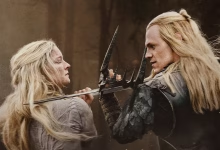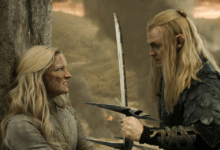Lord of the Rings producer addresses the “rumored rivalry” between The Rings of Power and the movies: “There is absolutely not and I don’t believe there is from their part either”

Exclusive: Philippa Boyens says that the various Lord of the Rings projects should “complement each other”
Since The Lord of the Rings trilogy concluded in 2003, there’s been a live-action adaptation of J.R.R. Tolkien’s prequel The Hobbit and an original spin-off series, The Rings of Power.
Now, after a decade away from the big screen, Middle-earth has returned to theaters with the anime epic The Lord of the Rings: The War of the Rohirrim.
Directed by Kenji Kamiyama, the film is inspired by a brief story in Tolkien’s appendices about the former King of Rohan, Helm Hammerhand, and his two sons and unnamed daughter, who becomes Héra in the film.
Despite being set 183 years before the events of The Lord of the Rings, the animated feature features more than one link to the live-action films as director Peter Jackson and Philippa Boyens, who worked on all six films, both return as producers.
In a new interview with GamesRadar+, Boyens addressed the “rumoured rivalry” between the Amazon Prime Video series and the creative team behind the original live-action films, this new animated feature, and the upcoming spin-off, The Hunt for Gollum.
“I have this belief and I hope it’s true that in terms of The Rings of Power, I think being able to expand upon the world is only a good thing,” Boyens says.
“I particularly love that particular piece of Middle-earth history. Some people seem to think there is a rivalry or conflict between the projects, but there is absolutely not and I don’t believe there is from their part either. They should complement each other. Let’s have more Tolkien, can you ever have too much?”
For their initial return to Middle-earth, Boyens thought animation was the “perfect” medium to introduce these new characters, as opposed to centring the spin-off on an existing character from the live-action movies.
“We knew that we wanted it to be a standalone story to be able to introduce new characters to the audience,” she says. “We wanted the world of Middle-earth, as we know it, to be there on the periphery, but not to be driving the story – it wasn’t being driven by the Dark Lord or the Ring. We also knew that we didn’t necessarily want to anchor it in one of the characters from the live-action movies, not yet, anyway.”
Instead, the central focus is the “wild” and rebellious warrior princess Héra (Gaia Wise), who Boyens insists was the “natural” lead for the story. “I think some people think we deliberately set out to have a lead female character, but when you asked, why not one of the sons? Did you see what happened to those boys? It becomes self-evident,” she continues.
“They’re interesting characters and beautifully voiced by our actors in the story, but really fated characters. When you look at what’s at the beginning and the heart of this conflict, it is actually that unnamed daughter.”
As every decision is made for Héra in her life, including whether she can fight for her people, who she can marry, where she can travel, Boyens wanted to explore how she felt about this complete lack of agency.
“If you start to add other layers on that, such as, what if the boy who’s stepping forward seeking her hand is her friend, her childhood friend? So many things become destroyed along the way,” she adds.
“As soon as you start delving into that, you follow the natural threads of the story, which is the wreckage of war. Who is left standing through these incredible events that play out? So, the story itself began to tell us who was going to be the most interesting character to view this story through.”

